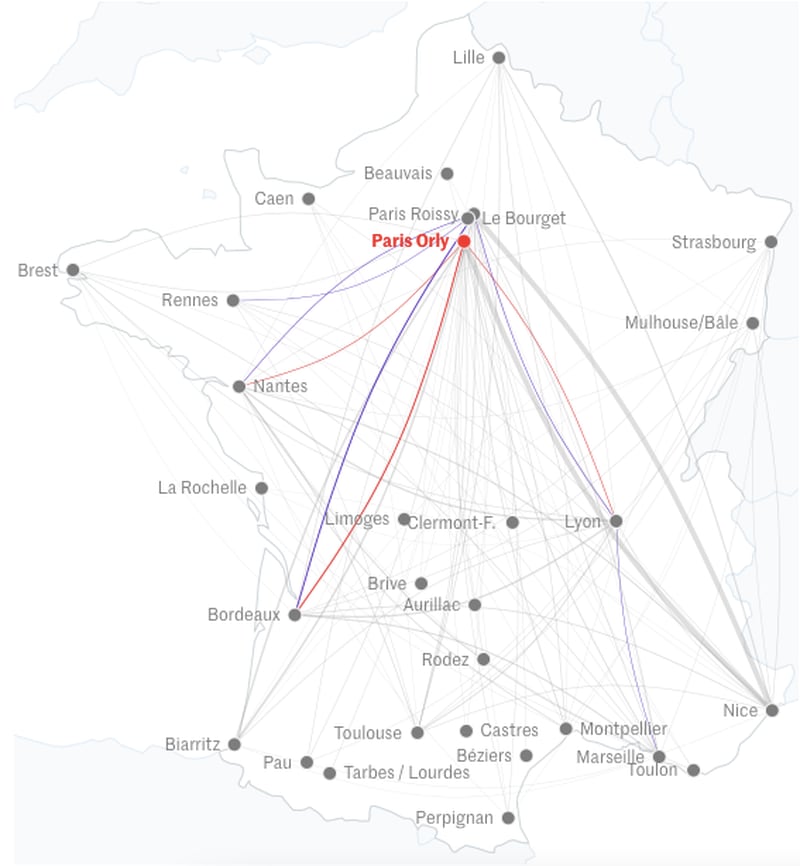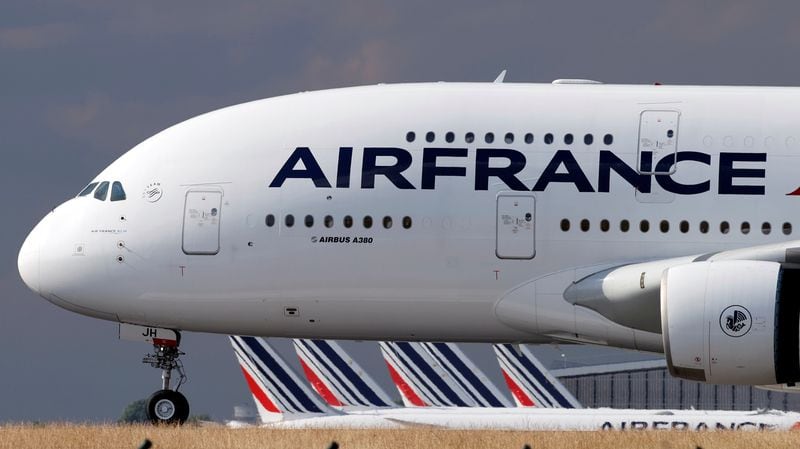The measure provided for by the climate law prevents airlines from making journeys that can be carried out by train in two and a half hours, thus cutting the links between Paris-Orly airport with Bordeaux, Nantes and Lyon.
A pioneering measure in the world for the government, but a “Pandora’s box” according to the airlines. This Tuesday, a law came into force in France that abolishes any type of domestic flight in the country that can be done in less than two and a half hours by train. This, in order to promote the use of railway lines and thus fight against global warming.
Despite the many limitations that the Climate Law has suffered on its way, since its lifting in 2021, it makes France the first country in the world, according to the Minister of Transport Clément Beaune, to set up a similar device, prohibit commercial flights that are too short.
“This morning, the ban on airlines in the event of an alternative of less than two and a half hours by train has become a reality. This is a major and first signal in the world, let’s continue!”, Wrote the boss of Transport on Twitter.
Despite the ambitious intention, the text met with much resistance from the airlines, and ended up limiting, for various reasons, its concrete impact. The application of this law, which already took effect on Tuesday, puts an end to three routes already canceled in 2021. “The connections between Paris-Orly and Bordeaux, Nantes and Lyon will be prohibited” , emphasizes the implementing decision recorded in the Official Journal. These routes have already been canceled due to the pandemic, when the number of flights dropped dramatically.
Initially, the measure would affect eight links, but ended up maintaining around five for at least three years. This, because flights from Paris-Charles de Gaulle to Bordeaux and Nantes have been maintained.
From the same airport, services to Rennes, Lyon and Marseille will be maintained: this, because “the current state of the train offer” is not enough to match what is offered by plane. For this very reason, many consider the law to have come to be a “strong symbol”, but this is still not consistent with the purpose of sufficiently encouraging the train.

One of the reasons that held back a large part of the connections that had to be canceled is the exception of Charles De Gaulle airport, “a subtle legislative arrangement”. The law assumes that if an airport has a train station nearby, This station will be used to count the two and a half hour limit. Since Paris and Roissy, the city where the airport is located, are 35 minutes apart, some journeys have been saved from the ban.
However, all routes, whether prohibited or not, will be reviewed every three years. The removal of other connections between cities will therefore depend on the “the future improvement of rail services, which have sufficient frequencies and timetables which satisfy” the demand that airplanes provide.
Despite the fact that the ban didn’t have much of an impact, the Union Française des Compagnies Aériennes wasted no time in -literally- shouting loud and clear, from the moment they saw some of its possibilities sale of flights threatened. of such an entity, came to speculate about the banning of Paris-Barcelona flights in the future because they can be done by train.

The Minister of Transport knows, however, that the measure did not cause great effects. In an interview on French television on Wednesday, he said: “I’m telling you, we’re going to go further, we’re going to go further.” Referring to the list of prohibited flights, he assured that “We will review it twice a year to see if the rail offer improves.”
“My responsibility as Minister of Transport is precisely to improve rail links so that, little by little, this two and a half hour rule can close more airlines. We have closed three of them, and we will continue. We may even gradually tighten this rule, to bring it to three hours. said Beaune.
When asked if he would increase the law to four hours, Beaune replied that “It is possible, but the trains must be developed in parallel” . He also took the opportunity to discuss the purchase of more TGVs (high-speed trains), and the project to build a TGV line to link Bordeaux and Toulouse.
Taken in the name of the fight against climate change, the government’s decision will have a rather limited effect on greenhouse gas emissions in France, even within the aeronautical industry. According to the calculations of the Directorate General of Civil Aviation, approximately 55,000 tonnes of CO2 per year will be saved, i.e. 2.6% of emissions related to domestic flights in France.
However, the effect of the law is valued when comparing modes of transport. On average, a single passenger on a domestic flight generates an average of 258 g/CO2/km, compared to 147 g/CO2/km that would be emitted by car. The cleanest option remains the TGV, where each passenger produces 3.34 g/CO2/km, i.e. 80 times less than it would in the air.
Source: Latercera
I am David Jack and I have been working in the news industry for over 10 years. As an experienced journalist, I specialize in covering sports news with a focus on golf. My articles have been published by some of the most respected publications in the world including The New York Times and Sports Illustrated.


